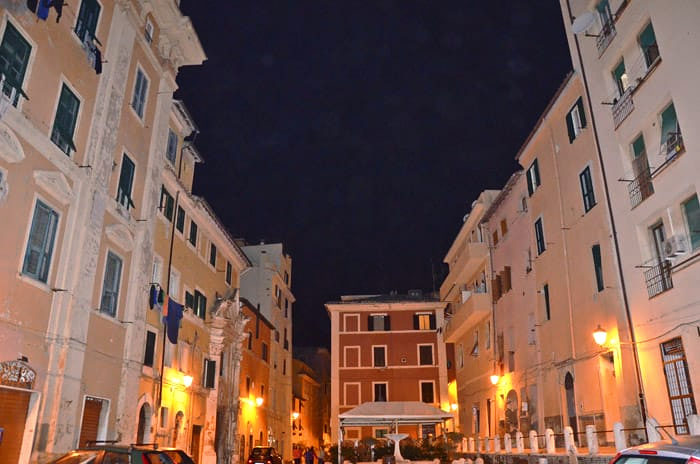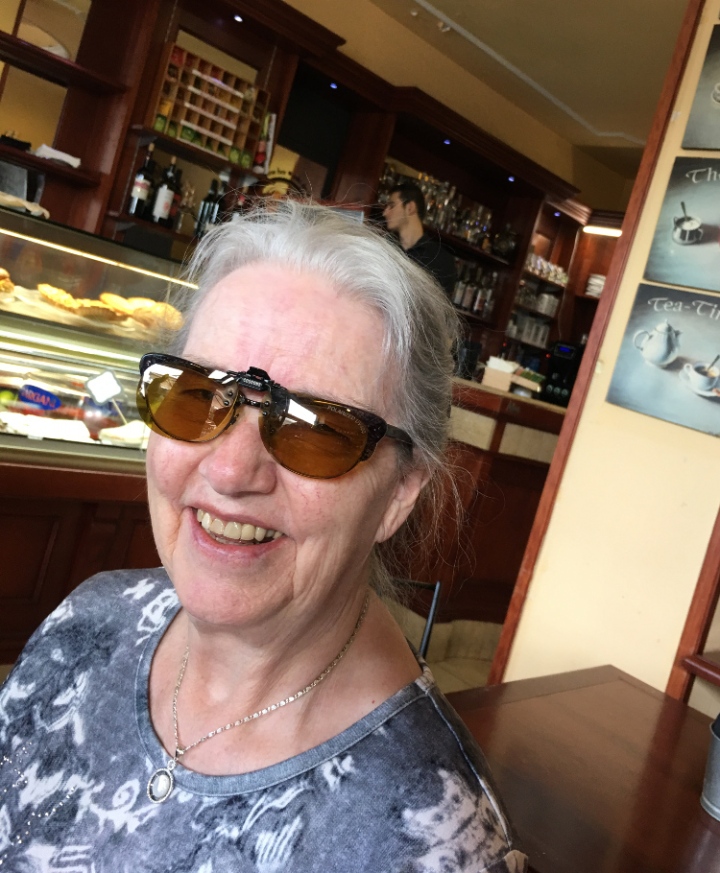
The discussion over the third from last post had focused a) on a different vision of Italy by Italians from Italy and by North Americans of Italian origin; b) on Italian and Roman roots and the survival of ways which the Roman actress Anna Magnani epitomizes.
This post is mainly reporting the discussion over the second topic. I hence apologize to those readers whose comments have been omitted. I also apologize since all published comments have been edited out for the sake of brevity. Here you can read the original discussion.
Ψ
MoR. When I wrote this post I had some headache and I later realised a few words were not just right. For example, Anna Magnani “weird mixture of nobility and abjection …” was overstated. I changed ‘abjection’ with ‘crudity’. Such crudity, not deprived of nobleness, is present almost only in Rome in my view. I’m sure the great and unusual past of the eternal city has something to do with it.

Joe@italyville. In my opinion, you must be critical of your country. What would have happened if there was no criticism of Mussolini or Bush. If we didn’t criticize the handling of New Orleans or the trash in the streets of Napoli. [Joe’s blog]
The Commentator. These videos and songs remind me of my close friend Flavio who is, like me, Canadian born and my age. In the 1990s, I devoured Italian and French films ad nauseam. In the case of Italian films two defining characteristics stood out for me: humor, as in using humor to deal with the hard side of Italian life. The other was realism. Italians faced their decadence through film. My close friend Flavio made the exact same remarks about Romans as you said in your post. He found them to be crude. [The Commentator’s blog]
MoR. Well, Rome is so beautiful that those who have produced such beauty cannot be defined as just ‘crude’. There must be something else.

Joanne at Frutto della Passione. As a Canadian of Italian descent, living in Italy I know without a doubt that my view of Italy is very different from my father’s (Italian born, immigrated to Canada) who views it as the motherland and has romanticized it and all of his memories. My view? It changes almost daily. Somedays I love it beyond words other days it frustrates me to the point of tears. [Joanne’s blog]
MoR. I understand your difficulties, despite your roots. Well, here in Italy habits survive that puzzle many foreigners, historical remnants whose disadvantages towards ‘modernity’ seem clear. Are they only disadvantages? Foreigners from North America surely don’t come to Rome or to Naples to admire how scientifically organized traffic is. They come to enjoy other stuff (and not just the monuments.)
Commentator. Just would like to add something else. While there’s no doubt many still look fondly back on Italy, there are still others who don’t. I’ve known and met many Italians who wanted to forget everything about the old country and wanted nothing to do with it. Such was their anger towards her.
MoR. As I told Joanne, some survivals are real obstacles to progress. The “patron-client” relationship, for example, present here in disgusting ways: in universities, in state institutions and in the civil society of areas of the country. I don’t think it’s by chance that ‘patronatus’, ‘patronus’, ‘clientes’ are Ancient Roman words and concepts. I mean, favouritisms, recommendations etc. are here so ingrained that the best brains fly to countries where there is more meritocracy.

Paul Costopoulos. Dear MoR, “favouritism” exists everywhere. Here, we call it the “Old boys network” or “le patronage”, in Québec. Merit certainly enters the equation somewhere but «knowing the right person» is of great help. What my women friends of all origins were bothered by in Italy was the ogling and buttocks pinching they endured. It seems Italian males have restless hands. Maybe that is what Frutto della passione is writing about. Fruit of passion…very evocative. [Paul’s blog]
MoR. Ah ah ah, Paul, you made me laugh! Yes, you made me laugh but then you depressed me (even though I’ll say aloud to my female readers that I don’t go around pinching buttocks.)
Paul. Cheer up Man, certainly the sun and warm Mediterranean climate is responsible for all that. All those provocative sculptures that ornate your squares, fountains and even churches are probably the main culprits. They overstimulate and induce into temptation even the most hardy souls as so many popes attest to. The Medicis popes surely are eloquent examples.
MoR. Yes, Paul, yes, even the most hardy souls, no doubt.
Paul. You show great fortitude.
MoR. I do, Paul.
[See a post on Italian Don Juanism, an irritating behaviour now declining, to tell the truth]
Commentator. Quebec functions very much like a Latin country (corruption, patronage etc.), like Italy – only it’s not so overt.
Paul. Commentator, it’s not only less overt, it’s also less. Under Maurice Duplessis, from 1936 to 1960 it was rampant and well organised, since then checks have been put in place…

Commentator. Here’s yet another thing regarding M. Anna Magnani. I was observing her and couldn’t help but notice she shares a common trait with how Italian women are generally perceived here. There are more “Anna’s” than women with the sensibilities or accent of a Northerner. Here, it’s all Rome and south. I went to school with many tough, joyous “Anna’s.” And you know what? There was indeed a certain way to them. What came off as crude didn’t mean there wasn’t a typically Italian panache to them. Shoot, in my family alone we have a gal that pretty much is Anna.
Mor. People in fact migrated from the most traditional areas of this country. I too like this crudity: it has verve, dash. Wow, so you have an Anna in family. Well, I do also, to a certain extent. These Annas I call ‘ancient’. Fellini said Anna (Annas) is/are a symbol and a survival. This he also meant by “She-wolf and Vestal, aristocratic and tramp, dark and buffoonish;” (listen to him saying it to Anna in the film “Roma”.)
I’m sure the perception of the artist is sometimes superior to that of the scholar. On the other hand, in my opinion, a peasant from the Italian South (or from Greece) is closer to the Greco-Romans than any historian of antiquity.
Moreover it could be that in the New World – and you seem to confirm it – some primordial traits are preserved, like hibernated, while here they can disappear: take archaisms in language (US ‘gotten’ instead of the more recent UK ‘got’), or cultures like the Amish in Ohio & Pennsylvania.
Actually I met a stunning Anna from Chicago here in Rome. This post tells about her .
Commentator. We are caught in an “Italy from a time past.” My friend went to Sicily in the early 1990s and they laughed at his accent. “We don’t speak dialect any more!”
MoR. Which makes the New World even more fascinating to me!
 Paul. Man of Roma, the so called New World is a reservoir of cultures. The USA has strived to homogenize, the others such as Canada have taken pain to recognize, and even preserve, the cultures of their immigrant citizens. Thus our Anglophones speak a Victorian English, dans plusieurs régions du Canada les francophones parlent la langue de la province française de leurs ancêtres. The others tend to bunch together often by villages or towns they come from and keep the traditions and languages, at least the second, and at times third, generation. Montreal, Toronto, Vancouver all have strong ethnic neighbourhoods where you find restaurants, stores, groceries, newspapers all catering to the native tongue of their inhabitants. It’s the Canadian mosaic…and I love it.
Paul. Man of Roma, the so called New World is a reservoir of cultures. The USA has strived to homogenize, the others such as Canada have taken pain to recognize, and even preserve, the cultures of their immigrant citizens. Thus our Anglophones speak a Victorian English, dans plusieurs régions du Canada les francophones parlent la langue de la province française de leurs ancêtres. The others tend to bunch together often by villages or towns they come from and keep the traditions and languages, at least the second, and at times third, generation. Montreal, Toronto, Vancouver all have strong ethnic neighbourhoods where you find restaurants, stores, groceries, newspapers all catering to the native tongue of their inhabitants. It’s the Canadian mosaic…and I love it.

MoR. The Commentator had told me a bit about this USA – Canada difference. I have to get to Canada some day. I think I have a friend living in Toronto. I might love Montreal better though. Some students had told me Montreal is like a world-wide francophone hub, thence my interest.
Exposrip. As for melting pot versus multiculturalism I think I break with Paul here. Personally, enshrining multiculturalism in the Charter is nonsense. [Exposrip’s blog, warehouse of Commentator’s stories]
MoR. I see your point about multiculturalism: you care more about a Canadian identity, which I can understand. Although, call it selfishness, I like that somewhere things are preserved.
Paul. Go to Little Italy around La Madonna della Diffesa and you won’t know you are in Montreal. You may even not hear a word of French or English, but maybe lots of Abruzzi and Calabresi. As for food well you will judge. Caffe Italia may also please you.
Commentator. I think MOR would want to observe French-Canadian culture in action on rue St. Denis.
Paul. I agree with The Commentator, St-Denis and the Latin Quarter aroud UQAM are French Montreal “par excellence”.
MoR. I’ll be there Paul.

Paul. Welcome, and let us know, perhaps we could arrange a little informal meeting…however risky that may be…you know the Web and all that.
MoR. Thank you for saying that Paul. Oh … of course Paul, the risky chat encounters … I’ll bring my 4 bodyguards.
Paul. Sounds like a Maffia boss, I may hide. Ha! Ha!
MoR. Ah ah ah
(*Silly Roman laugh…making a phone call in search of the four boys*)
…
Ψ
Other related posts:
Italian Songs. Anna Magnani, Dean Martin, Pavarotti and the Three Tenors
Pre-Christian Rome lives
Experiencing All













